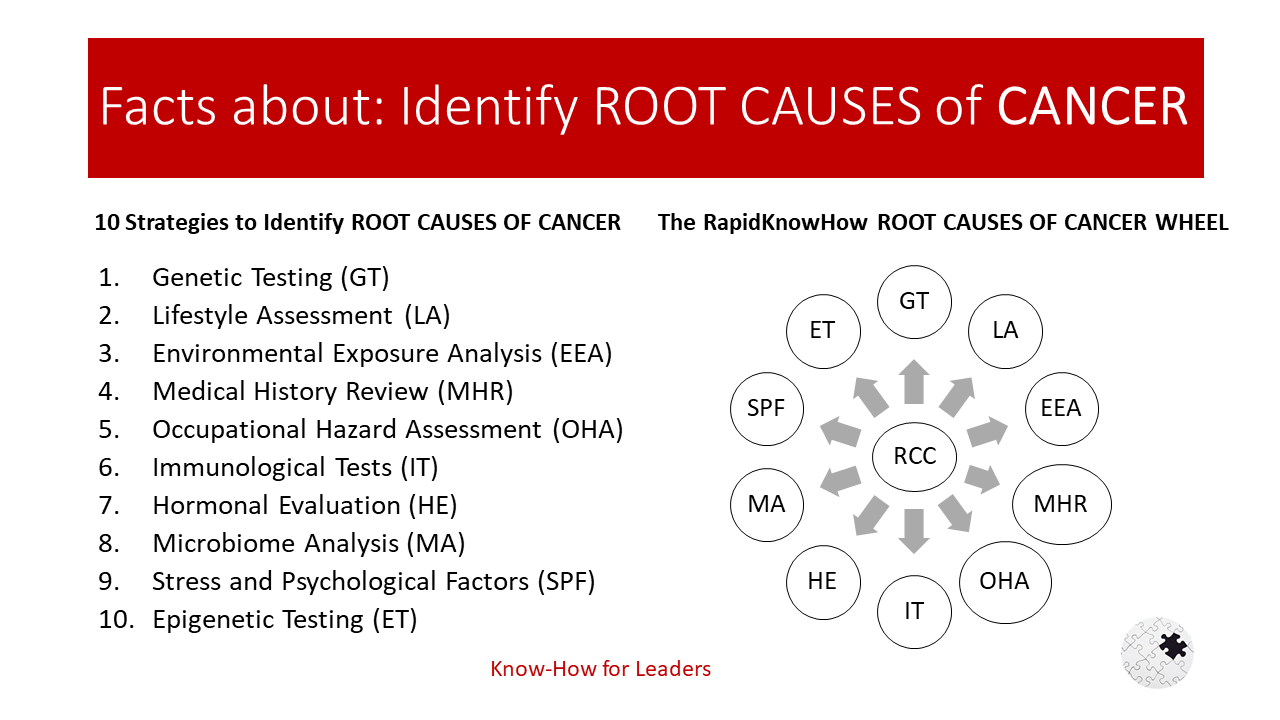Cancer is a complex and multifaceted disease that has been the subject of extensive research for many years. It is characterized by the uncontrolled growth and spread of abnormal cells in the body. While the exact root causes of cancer are not entirely understood, it is widely accepted that it results from a combination of genetic and environmental factors.
Here are ten strategies to identify these root causes:
1. **Genetic Testing**: Genetic testing can identify inherited gene mutations that may increase the risk of certain types of cancer. This can be particularly useful for individuals with a strong family history of cancer.
2. **Lifestyle Assessment**: Lifestyle factors such as diet, physical activity, alcohol consumption, and tobacco use can significantly influence cancer risk. A thorough assessment of these factors can help identify potential root causes.
3. **Environmental Exposure Analysis**: Long-term exposure to certain environmental factors such as radiation, certain chemicals, and pollutants can increase cancer risk. An analysis of an individual’s environment can help identify these potential carcinogens.
4. **Medical History Review**: Certain medical conditions or treatments can increase the risk of developing cancer. A comprehensive review of an individual’s medical history can reveal these potential triggers.
5. **Occupational Hazard Assessment**: Certain occupations expose individuals to specific carcinogens more than others. An occupational hazard assessment can help identify these risks.
6. **Immunological Tests**: The immune system plays a crucial role in preventing and controlling cancer growth. Immunological tests can help assess how well the immune system is functioning and whether it may be contributing to cancer development.
7. **Hormonal Evaluation**: Hormones play a significant role in some types of cancers like breast and prostate cancers. Evaluating hormonal levels and imbalances could provide insight into potential root causes.
8. **Microbiome Analysis**: Recent research suggests that our gut microbiome may influence our risk of developing cancer. Analyzing the microbiome could provide valuable information about potential cancer-causing imbalances.
9. **Stress and Psychological Factors**: Chronic stress and certain psychological factors can influence the risk of developing cancer. Evaluating these factors can help identify potential root causes.
10. **Epigenetic Testing**: Epigenetics refers to changes in gene expression that do not involve alterations to the underlying DNA sequence. Some of these changes can increase cancer risk, and epigenetic testing can help identify them.
It’s important to note that while these strategies can help identify potential root causes of cancer, they cannot predict with certainty who will develop cancer. Cancer is a complex disease that likely results from a combination of many factors. Therefore, it’s crucial to approach this topic with a comprehensive, holistic perspective rather than focusing on single potential causes.
Moreover, identifying potential root causes is just the first step in preventing and treating cancer. It’s equally important to take proactive steps to mitigate these risks, such as adopting a healthy lifestyle, reducing exposure to known carcinogens, and seeking regular medical check-ups. Always consult with healthcare professionals for personalized advice regarding cancer prevention and treatment.
